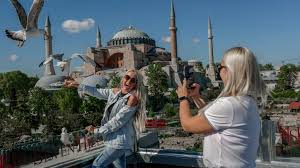جولة سياحية في بحيرات أذربيجان الجبلية تتمتع بحيرات أذربيجان الجبلية بجمال طبيعي خلاب وساحر يجعلها وجهة سياحية مثالية لمحبي الطبيعة والمغامرات. تعتبر هذه البحيرات من أهم المعالم السياحية في أذربيجان، حيث تضم العديد من البحيرات الجبلية الساحرة التي تتميز بمياهها الزرقاء الواضحة والمحاطة بمناظر طبيعية خلابة. في هذه الجولة السياحية ستحظى بفرصة استكشاف هذه الجواهر الطبيعية والتمتع بمشاهدتها من قرب، وسط جولة مثيرة وممتعة تتيح لك موقع اذربيجان على الخريطة الاستمتاع بمناظر رائعة وتجربة مغامرات لا تُنسى.
توجد في أذربيجان العديد من البحيرات الجبلية الخلابة التي تستحق الزيارة، مثل بحيرة شِرو، وبحيرة غويزالغول، وبحيرة غويغول. يمكنك الاستمتاع بجولة سياحية رائعة حول هذه منطقة شاكي اذربيجان البحيرات للاستمتاع بجمال الطبيعة والاسترخاء في جو هادئ ومريح. كما يمكنك القيام بأنشطة مثل ركوب القوارب أو الصيد في بعض هذه البحيرات. بالتأكيد ستكون هذه الجولة تجربة ممتعة ومثيرة للاكتشاف الطبيعة الخلابة في أذربيجان.
استمتع بجمال الطبيعة الخلابة في بحيرات أذربيجان الجبلية

اكتشف جمال بحيرات أذربيجان الجبلية وتأمل الطبيعة الخلابة والمناظر ايهما افضل البوسنة او اذربيجان الطبيعية الساحرة التي تحتويها. يمكنك الاستمتاع بجولة سياحية تشمل زيارة البحيرات الجبلية الساحرة والتمتع بالهواء النقي والمناظر الطبيعية الخلابة.
توجد في أذربيجان العديد من البحيرات الجبلية الخلابة التي تُعتبر من أكثر المواقع سحرًا وجاذبية في البلاد. تتميز هذه البحيرات بمياهها الصافية والزرقاء الجميلة والمحاطة بمناظر طبيعية استثنائية. من بين أبرز البحيرات الجبلية في أذربيجان تلك التي تقع في منطقة قره داغ، والتي تعد واحدة من أكبر البحيرات الجبلية في البلاد. كما توجد أيضًا بحيرة شاهداغ وبحيرة گويشگول، والتي تعتبر محمية طبيعية تضم مجموعة متنوعة من الحياة البرية. إذا كنت تحب قضاء الوقت في الهواء الطلق والتمتع بجمال الطبيعة الخلابة، فإن زيارة بحيرات أذربيجان الجبلية تعد خيارًا مثاليًا لك.
استرخِ واستمتع بالمناظر الطبيعية الخلابة في بحيرات أذربيجان

اقض بعض الوقت في الاسترخاء والاستمتاع بالهدوء والسكينة في بحيرات أذربيجان الجبلية. يمكنك الاستمتاع بالمشي في محيط البحيرات والتمتع بجمال الطبيعة الخلابة والهواء النقي الذي يحيط بها.
يعتبر استرخاء والاستمتاع بالمناظر الطبيعية الخلابة في بحيرات أذربيجان تجربة لا تُضاهى. تحتوي أذربيجان على العديد من البحيرات الجميلة التي توفر فرصًا رائعة للاسترخاء والاستمتاع بالطبيعة. تشتهر بحيرة غانجا بمياهها الزرقاء الواضحة ومناظرها الطبيعية الخلابة. كما تعتبر بحيرة شهبولا جنة للطيور وتجذب الكثير من عشاق مشاهدة الطيور. بالإضافة إلى ذلك، توفر بحيرة مرال مواقع رائعة لركوب الزوارق وصيد الأسماك وهي ملاذ هادئ للاستمتاع بالهدوء والسكينة. بحيرات أذربيجان تعتبر وجهة مثالية لمحبي الطبيعة والهدوء، حيث يمكنهم الاستمتاع بالمساحات الطبيعية الخلابة والتجارب الفريدة.
تعرف على التاريخ والثقافة المحلية أثناء جولتك في بحيرات أذربيجان

استمتع بتجربة تاريخية وثقافية فريدة أثناء جولتك في بحيرات أذربيجان الجبلية. يمكنك زيارة القرى المحلية والتعرف على الثقافة المحلية والمشاهدة العادات والتقاليد الشعبية.
أثناء جولتك في بحيرات أذربيجان، ستكتشف تاريخاً غنياً وثقافة محلية مثيرة. بحيرات أذربيجان تعتبر موطناً للعديد من المواقع التاريخية الهامة، بما في ذلك قلعة شاهدباش ومعبد أتشين. كما يمكنك استكشاف حياة القرويين المحلية والمشاركة في الأنشطة التقليدية مثل صيد الأسماك والطهي الشعبي. تجول في الأسواق المحلية وتعرف على الحرف اليدوية التقليدية والخدمات السياحية المحلية. كما يمكنك معرفة المزيد عن تقاليد الموسيقى والرقص في المنطقة والمشاركة في الفعاليات الثقافية المحلية.
اكتشف تنوع الحياة البرية والبيئة الطبيعية في بحيرات أذربيجان

استمتع بمشاهدة التنوع البيولوجي والحياة البرية المذهلة التي تتواجد في بحيرات أذربيجان الجبلية. يمكنك القيام بجولة سياحية لمشاهدة الحيوانات والنباتات النادرة والمذهلة التي تعيش في هذه البحيرات.
تنوّعت الحياة البرية والبيئة الطبيعية في بحيرات أذربيجان بشكل لافت، حيث تعتبر هذه البحيرات وجهة مثالية لمحبي الطبيعة وعشاق الحياة البرية. تتمتع بحيرات أذربيجان بتنوع كبير في الحيوانات المائية والنباتات، بالإضافة إلى وجود العديد من الطيور المهاجرة والمحلية. تشتهر بحيرات أذربيجان بأنها عبارة عن موطن للعديد من أنواع الأسماك والزواحف والثدييات، وتضم أيضًا مجموعة متنوعة من النباتات المائية والمحاقن. كما أن البيئة الطبيعية المحيطة بالبحيرات تتميز بجمالها واستقرارها، مما يجعلها ملاذًا للحيوانات البرية. هذا يجعل من بحيرات أذربيجان وجهة مثالية للسياح الذين يبحثون عن تجربة فريدة في استكشاف الحياة البرية والاستمتاع بالطبيعة الخلابة والمناظر الطبيعية الخلابة.
تذوق المأكولات المحلية واستمتع بضيافة أهالي بحيرات أذربيجان
استمتع بتذوق المأكولات الشهية التقليدية واستمتع بضيافة أهالي بحيرات أذربيجان الجبلية. يمكنك الاستمتاع بتجربة الطعام المحلي اللذيذ والتعرف على طرق إعداده ومكوناته الفريدة.
يمكنك تذوق المأكولات المحلية الشهية في بحيرات أذربيجان والاستمتاع بضيافة أهالي المنطقة المحلية. ستجد مجموعة متنوعة من الأطعمة الشهية المحضرة بمهارة وحب، مثل اللحوم المشوية والأسماك الطازجة والمأكولات البحرية. كما يمكنك تذوق الأطعمة المحلية النموذجية، مثل الدولما والبوريك والكعك الشهير. تجربة تناول الطعام مع السكان المحليين ستضيف لرحلتك طعمًا مميزًا وتعرفك على ثقافتهم وتقاليدهم.
استكشف جمال الشلالات المنهمرة في بحيرات أذربيجان الجبلية
قم بجولة لاستكشاف شلالات بحيرات أذربيجان الجبلية وتمتع بمناظر الشلالات المنهمرة الخلابة. يمكنك الاستمتاع بمشاهدة تدفق المياه والتمتع بالجمال الطبيعي الفريد الذي توفره هذه الشلالات.
يمكنك استكشاف جمال الشلالات المنهمرة في بحيرات أذربيجان الجبلية التي تعتبر واحدة من أكثر الوجهات الطبيعية روعة في البلاد. تتميز هذه الشلالات بطبيعتها الخلابة ومياهها الصافية التي تجذب الزوار من جميع أنحاء العالم. بالإضافة إلى ذلك، يمكنك الاستمتاع بالمناظر الطبيعية الخلابة والهواء النقي أثناء جولة حول البحيرات الجبلية. كما يتاح للزوار القيام بنشاطات مثل الغوص والتجديف وصيد الأسماك. بالتأكيد ستكون تجربة لا تنسى وفرصة رائعة للاستمتاع بجمال الطبيعة في أذربيجان.
استمتع بالأنشطة الرياضية المائية في بحيرات أذربيجان الجبلية
قم بتجربة الأنشطة الرياضية المائية المثيرة التي توفرها بحيرات أذربيجان الجبلية. يمكنك القيام بالتجديف أو ركوب الزوارق والتمتع بمغامرات مائية مثيرة على مياه البحيرات الجبلية.
توفر بحيرات أذربيجان الجبلية فرصًا رائعة للاستمتاع بالأنشطة الرياضية المائية. يمكنك الاستمتاع بالتجديف في بحيرة غويغول، وهي واحدة من أجمل البحيرات في البلاد، والتي توفر مناظر طبيعية خلابة وفرصًا رائعة للاستمتاع بالرياضات المائية. بالإضافة إلى ذلك، يمكنك القيام برحلات صيد ممتعة في بحيرة شهلار، حيث يمكنك قضاء يوم ممتع في صيد الأسماك والاستمتاع بالمناظر الخلابة للجبال المحيطة. ولمن يفضلون الاسترخاء والاستمتاع بالمياه الهادئة، يمكنهم الاستمتاع بالسباحة في بحيرة نوخور. بإمكانك أيضًا الاستمتاع بالتزلج على الماء في بحيرة طوزلار أو القيام برحلة بالزورق في بحيرة بلوران، مما يجعل الرحلة إلى بحيرات أذربيجان تجربة رائعة لمحبي الأنشطة الرياضية المائية.
قم برحلة تصوير فوتوغرافي لتسجيل جمال بحيرات أذربيجان
احتفظ بذكريات رائعة وجميلة من جولتك في بحيرات أذربيجان الجبلية من خلال إجراء رحلة تصوير فوتوغرافي. يمكنك توثيق الطبيعة الحية والمناظر الخلابة المحيطة بالبحيرات بكاميرتك.
سوف تقوم الرحلة بزيارة بحيرات أذربيجان المذهلة مثل بحيرة غانداش وبحيرة شاهده وبحيرة مغاش والتقاط صور مذهلة لجمال الطبيعة في تلك المناطق. ستكون الفرصة مثالية لتوثيق الطبيعة الخلابة والمناظر الطبيعية الرائعة. ستتاح لك فرص التصوير في أوقات مختلفة من اليوم لتلتقط أفضل الصور بإضاءة مثالية. كما ستحصل على دعم ونصائح من مصور محترف خلال الرحلة. إنها فرصة فريدة للاستمتاع بتجربة تصوير مميزة في أذربيجان.
تجربة الصيد في بحيرات أذربيجان الجبلية
الأماكن السياحية في اذربيجان المسافرون العرب
استمتع بتجربة الصيد المثيرة في بحيرات أذربيجان الجبلية واستمتع بصيد الأسماك الطازجة. يمكنك الاستمتاع بالهدوء والسكينة وممارسة هواية الصيد في المناظر الطبيعية الرائعة.
تجربة الصيد في بحيرات أذربيجان الجبلية تعد واحدة من أفضل التجارب لعشاق الصيد في العالم. تتميز هذه البحيرات بمحيطها الطبيعي الخلاب والمياه النقية والأسماك الغنية. يمكن للصيادين الاستمتاع بصيد الأسماك الكبيرة مثل السمك الأحمر والسمك الصيد الأذربيجاني، وهناك فرصة جيدة للصيد بطريقة الصيد بالطعم الصطناعي والطعم الطبيعي. بالإضافة إلى ذلك، يمكن للصيادين الاستمتاع أيضًا بمشاهدة الطيور المائية والحياة البرية الجميلة التي تحيط بالبحيرات. إنها تجربة فريدة لا تُنسى لمحبي الصيد والطبيعة.
استمتع برحلة تنزه في طبيعة خلابة في جولة بحيرات أذربيجان الجبلية
قم برحلة تنزه ممتعة ومثيرة في بحيرات أذربيجان الجبلية وتمتع بالهواء النقي والمناظر الطبيعية الخلابة. يمكنك الاستمتاع بالمشي والتجول على ضفاف البحيرات والاستمتاع بالهدوء والسكينة في الطبيعة.
تنطلق جولة بحيرات أذربيجان الجبلية لاستكشاف الطبيعة الخلابة والمناظر الطبيعية الخلابة. ستحظى بفرصة للاستمتاع بالمشي في الغابات الكثيفة والتجول حول البحيرات الزرقاء الرائعة. ستكون لديك الفرصة أيضًا للاستمتاع برؤية الحياة البرية والطيور المحلية. تتمتع هذه الجولة بمسارات متنوعة وتضم مجموعة متنوعة من البحيرات الجبلية التي توفر للزوار مناظر خلابة وتجارب رائعة. ستكون تجربة تنزهك في طبيعة خلابة بالتأكيد ممتعة وستخلف ذكريات لا تنسى. إذا كنت تبحث عن تجربة فريدة وممتعة في الطبيعة، فإن جولة بحيرات أذربيجان الجبلية هي الخيار الأمثل لك.













